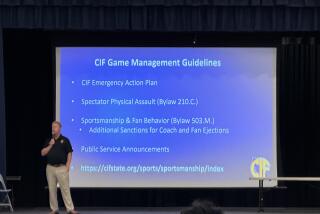State Erects New Barrier for Coaches : Education Code Changed to Require Credentials
- Share via
Few Valley-area coaches can match Harry Welch’s credentials. The Canyon High football coach has amassed a 70-10 record in a six-season career that has included two Southern Section championships and a 46-game winning streak.
But Welch might have a credential problem looming. Under revisions to the state’s education code that will take effect in the 1989-90 school year, he will be unqualified to coach.
Unlike most coaches who are credentialed in physical education or carry general-subject credentials, Welch teaches English and is credentialed in that subject area only. The newly approved regulations call for strict accountability among the state’s public schools, trying to ensure that teachers are properly credentialed for the subjects they teach.
Under those revisions, anyone coaching a sport that counts for class credit toward physical education must be credentialed in physical education. That could take Welch off the sidelines, but Canyon Principal Bill White insists that the coach’s job is safe.
“I understand the new law; they want round pegs in round holes,” White said. “It has merit, but it could handicap us with coaches. But we’ll find ways to try and help . . . we’re going to keep Harry.”
Actually, the state may resolve the problem by the end of the summer. The state has offered an equivalency program whereby a teacher could qualify to coach by earning certificates in first aid and cardiopulmonary resuscitation.
But another legislative proposal, which is expected to pass before the start of the school year, could render that option moot. It mandates that all coaches obtain first-aid and CPR certificates regardless of which credentials they hold.
School districts for Conejo and Simi Valley high schools have set up sessions to help coaches earn their certificates, and similar programs are under way in the William S. Hart Union High School District, which includes Canyon, Hart and Saugus.
The City Section is conducting sessions this summer but will certify only a small percentage of the section’s nearly 800 coaches, forcing many to obtain certificates on their own time at their own expense. The American Red Cross offers an eight-hour first-aid class for $16 and an eight-hour CPR class for $12.
“We’ll do the best we can to provide training,” City Section Commissioner Hal Harkness said. “We can certify about 20 coaches per session and might be able to scrape together funding for about eight or 10 sessions. Coaches complain that they want to be compensated for out-of-pocket expenses. That’s wonderful, but life doesn’t work that way. This rule comes without any funding. There’s no way we’re going to pay 700 to 800 people for their time.”
Although most coaches resent the inconvenience, few will give up their jobs because of it, according to Bob Lofrano, who represents coaches on the City’s Interscholastic Athletics Committee. He is negotiating with Harkness to increase the number of sessions but holds little hope for success.
Welch and his Southern Section colleagues will get more help from their school districts than their City Section counterparts. Still, the trend disturbs him.
“There is the misconception among non-coaches who believe that the intrinsic rewards of coaching are so great that coaches will do anything, withstand any abuses to keep coaching,” he said. “Perhaps the implications are that we are on such ego trips we can be taken advantage of.
“But I feel like I walk a tightrope. The interaction with players and the community is exceptionally rewarding but the stress factors and inconveniences are exceptionally negative. I evaluate whether I should stay in coaching every few months because I get the feeling that it’s not worth it.
“But no matter what they do I’m going to coach through November.”
More to Read
Get our high school sports newsletter
Prep Rally is devoted to the SoCal high school sports experience, bringing you scores, stories and a behind-the-scenes look at what makes prep sports so popular.
You may occasionally receive promotional content from the Los Angeles Times.






